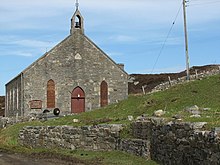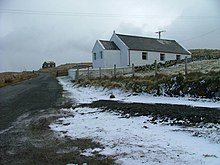Free Church of Scotland (since 1900)
The Free Church continues to be Reformed and conservative evangelical in character,[11] presenting its understanding of the Christian message, namely that Jesus Christ is sole Lord and Saviour.[13] At the Assembly of 1901 it was stated that the Free Church had twenty-five ministers and at least sixty-three congregations, with most being found in the Gaelic-speaking districts of Scotland.The litigation was initially decided in favour of the Free Church by the House of Lords in 1904, on the basis that in the absence of a power to change fundamental doctrines in the trust deed, a dissenting minority retains the property.Post-1945, the Free Church engaged with the wider evangelical cause, but after its growth in the early decades, it began a statistical decline that, except for a short period in the 1980s, continued throughout the 20th century.[citation needed] In the 1980s and 1990s there were allegations of sexual misconduct against Donald Macleod, principal of the Free Church College.A faction hostile[clarification needed] to Macleod pursued the charges in church courts, to no avail.When Rev Maurice Roberts of the Free Church Defence Association (FCDA) publicly reiterated accusations against Macleod, and denounced the General Assembly for its "wickedness and hypocrisy", he was suspended sine die for contumacy.With some growth it was recognised as a church plant in 2014 by the Glasgow Presbytery, and in 2016 appointed Iain MacAskill as its minister.Rev McMillan was unhappy about the Presbytery of Inverness, which had recently voted against controversial plans to give congregations the freedom to appoint a person in a gay relationship if they wished.There has been an increase in the numbers applying to the Free Church ministry, and studying in its Saturday course (provided by the Edinburgh Theological Seminary).[citation needed] The Free Church of Scotland holds services in several languages, including English, Gaelic, Slovak and Spanish.Since just after[39] the union of 1900 until the events of 2010, only the psalms of the Old Testament (and in a very few instances, paraphrases of other parts of the Bible) were sung during the services.However, in November 2010, a special plenary assembly took place to debate and vote on allowing the singing of hymns and use of musical instruments in Free Church services.The Church has maintained an extensive missionary commitment for its size, with missions in India, Peru and South Africa,[47] which now have self-governing status.


Free Church of Scotland (1843–1900)ChristianProtestantCalvinismPolityPresbyterianWorld Reformed FellowshipInternational Conference of Reformed ChurchesScotlandEdinburghChurch of ScotlandFree Church of Scotland (Continuing)detailsMinistersScottish Gaelicconservative evangelicalCalvinistFree Church of ScotlandUnited Presbyterian Church of ScotlandThe Wee FreesUnited Free ChurchCalvinist theologyWestminster Confessionpsaltertheological collegeThe MoundbuildingsReformedJesus ChristSaviourabortionsame-sex marriageconversion therapyReligion in ScotlandOverviewPrehistoricMedievalReformation17th century18th century19th centuryContemporaryChristianisationCum universiReformation ParliamentFive Articles of PerthNational CovenantSolemn League and CovenantThe Killing TimeMarrow ControversyPatronage Act 1711First SecessionSecond SecessionGreat Disruption of 1843Catholic emancipationTell Scotland MovementEvangelical revivalFreedom of religionMissionsPopular religionSaintsSectarianismAssociated Presbyterian ChurchesBaptist Union of ScotlandCongregational FederationDidaskoEastern OrthodoxyFellowship of Independent Evangelical ChurchesFree Presbyterian Church of ScotlandLatter-day SaintsMethodist Church of Great BritainOriental OrthodoxyReformed Presbyterian Church of ScotlandRoman Catholic ChurchSalvation ArmyScottish Episcopal ChurchUnited Free Church of ScotlandUnited Reformed ChurchOld and New LightsAnti-Burgher movementAssociate PresbyteryBereansBuchanitesCatholic Apostolic ChurchCovenantersCameronianEngagersKirk PartyEvangelical UnionGlasitesOriginal Secession ChurchRelief ChurchUnited Presbyterian ChurchUnited Secession ChurchAction of Churches Together in ScotlandIona CommunityScottish Bible SocietyScottish Churches Parliamentary OfficeBaháʼí FaithBuddhismHinduismJudaismcouncilPaganism (modern)SikhismColin BannatyneModeratorGaelicFree Church caseFree Church CollegeEvangelical QuarterlyUniversity of GlasgowPooleweDonald MacleodMaurice RobertscontumacyCourt of SessionLady PatonBroadford, Isle of SkyeLord UistInner HouseColin Archibald BannatyneCoulter, South LanarkshireJames Duff MacCullochHope Street, GlasgowDonald MacKinnon Macalister
